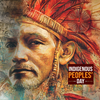
Honoring Resilience and Culture: The Significance of Indigenous Peoples' Day
, by Emily Perez, 5 min reading time

, by Emily Perez, 5 min reading time
In recent years, the second Monday of October has become a day to reflect, acknowledge, and honor the rich histories, cultures, and contributions of Indigenous peoples in the Americas. As more cities and states in the United States shift from celebrating Columbus Day to recognizing Indigenous Peoples' Day, we are prompted to rethink the narratives we've inherited about America's past and give voice to the people who lived on this land long before European colonization.
For centuries, the celebration of Columbus Day centered around the narrative of "discovery"—the idea that Christopher Columbus' arrival in the Americas in 1492 marked the beginning of a new world. However, this perspective overlooks the complex civilizations that existed across the continent long before Columbus set foot on these shores. Indigenous communities had established vibrant societies, rich traditions, and deep connections to the land for thousands of years.
Indigenous Peoples' Day is an opportunity to reflect on the consequences of Columbus’ arrival, which included the colonization, forced displacement, and suffering of Native populations. This day seeks to shift focus from the glorification of colonialism to the recognition of Indigenous resilience, celebrating their cultures and contributions in the face of centuries of oppression.
While Indigenous Peoples' Day is predominantly recognized in the United States, its significance resonates deeply in Latin America, where Indigenous cultures have been integral to the continent's identity. The legacy of colonization is stark in these regions, where the arrival of Columbus and subsequent European explorers led to the violent upheaval of Indigenous societies.
In many Latin American countries, the impact of colonization is still felt today, manifesting in social, political, and economic disparities. Indigenous peoples often face systemic discrimination, land dispossession, and cultural erosion. However, in the face of these challenges, many communities are actively reclaiming their identities, traditions, and rights.
Indigenous Peoples' Day serves as a reminder of this struggle and resilience. It highlights the importance of honoring Indigenous cultures, from the Quechua and Aymara in the Andes to the Mapuche in Chile and Argentina, and the many diverse groups across Mexico, Central America, and beyond. Celebrating this day helps promote awareness of the ongoing issues facing Indigenous peoples in Latin America, including land rights, language preservation, and cultural recognition.
The stories of Indigenous peoples are as varied and diverse as the land they have inhabited for generations. From the plains of the Lakota to the forests of the Cherokee, and from the coastal territories of the Wampanoag to the deserts of the Diné, Indigenous peoples have maintained their languages, customs, and spiritual beliefs despite immense challenges.
Indigenous Peoples' Day is a time to celebrate these cultural contributions. Indigenous art, music, storytelling, and traditions enrich the cultural fabric of North America and Latin America. From agriculture and food systems to medicine, governance, and environmental stewardship, Indigenous knowledge has shaped and continues to influence many aspects of modern society. The contributions of Native peoples extend into every field, from the arts and sciences to business and environmental activism.
For many, the move from Columbus Day to Indigenous Peoples' Day is not just symbolic—it represents an ongoing effort to right historical wrongs and to elevate Indigenous voices in modern discourse. The celebration of Columbus as a hero perpetuates a colonial mindset, one that dismisses the suffering and loss experienced by Native communities through genocide, disease, and forced assimilation.
Indigenous Peoples' Day seeks to correct this narrative by recognizing the strength, resilience, and beauty of Indigenous communities. It is a day to honor their histories and struggles, as well as to commit to justice and respect for their rights moving forward. This recognition is part of a broader movement toward acknowledging Indigenous sovereignty and cultural preservation.
Celebrating Indigenous Peoples' Day goes beyond simply acknowledging the day—it involves taking meaningful action. Here are a few ways to engage with the spirit of the day:
Learn and educate: Take the time to learn about the history of Indigenous peoples, including the specific tribes or nations in your region and in Latin America. Share this knowledge with others to help foster understanding and respect.
Support Indigenous communities: Seek out Indigenous-owned businesses, artisans, and organizations. Supporting these businesses helps empower Indigenous people economically and culturally.
Listen to Indigenous voices: Indigenous peoples are leading conversations on issues like environmental stewardship, social justice, and cultural preservation. Follow Indigenous activists, leaders, and creators to learn about the issues that matter to them.
Advocate for policy changes: Many Indigenous communities continue to fight for land rights, cultural preservation, and sovereignty. Advocacy for policies that protect their rights can help address historical and current injustices.
Indigenous Peoples' Day is not only a time to reflect on the past but also a call to action for the future. It encourages us to listen to the stories of Indigenous peoples, honor their contributions, and commit to supporting their ongoing efforts toward equality, recognition, and cultural preservation.
By celebrating Indigenous Peoples' Day, we take a step toward creating a society that values and respects all cultures, helping to build a future rooted in understanding, equity, and shared humanity.
Let’s take this day to honor the land we stand on and the people who have called it home for thousands of years, both in the U.S. and Latin America.


